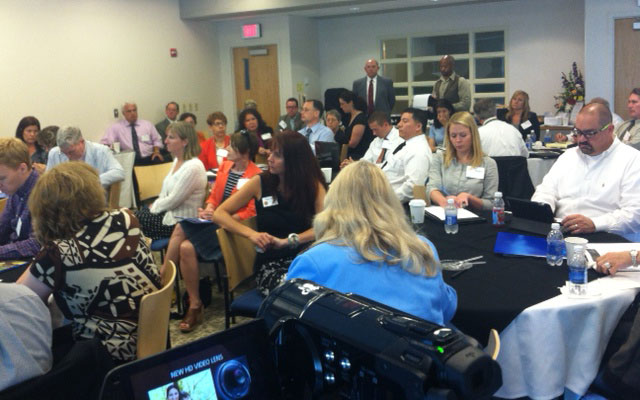
The SUNY Works summit, a three-day professional development event taking place at Hudson Valley Community College, wrapped up on Wednesday. The summit was kicked off with opening remarks from SUNY Chancellor Nancy Zimpher and brought together members of private industry, professional organizations, SUNY faculty and staff, and other higher education leaders. The partners engaged in talks around advancing and expanding cooperative education and formal internships within the SUNY system.
An increasing number of students need to work while in school, and employers are reporting that work experience is the biggest factor in their evaluation of potential hires. Cooperative education and internships allow students to integrate classroom theory with real world experience in business/industry and non-profit organizations across the state. With these facts at hand, the SUNY Works initiative has the potential to give students a leg up in their drive for success and career achievement. For more information on co-op/internships, read our intro post on SUNY Works.
The summit marks the start of the next stage of SUNY Works – an exciting growth that represents a unique opportunity for all students across the SUNY system. Nine SUNY pilot campuses brought the co-op/internship model to their students in the spring of 2011. Nine additional campuses are launching the program this fall. The summit allowed SUNY campuses and business partners to tap into the expertise and experience of the World Association for Cooperative Education (WACE). WACE is the only global association focusing on cooperative and work-based education and includes members from higher education, industry and business, and government from 27 countries around the world.
WACE provided expertise from highly successful members, including Dr. Richard Porter, Chair of Mathematics at Northeastern University. Northeastern’s renowned co-op program, founded over a century ago, engages over 7,000 students per year. Other members of the WACE team who shared their successes and failures in implementing co-op programs are former deans of technical and community colleges and/or directors of co-op programs at their respective colleges and universities. 
Dr. Paul Stonely, CEO of WACE, commended the “systemness” of the SUNY Works initiative, and encouraged the participants to continue to work together. “You can’t run a co-op with a fax machine and the internet,” he said. “It’s about relationships.”
Workshops focusing on building partnerships around educational goals, workforce competencies within a learning framework, and building infrastructure to support models of co-op gave campuses early in the stages of development a chance to ask questions from those who have success with the model. Along with the workshops were panel discussions that gave panelists like Jay Quaintance, Assistance Vice Chancellor for Community Colleges at SUNY administration, and the opportunity to answer questions and share their experiences and expertise with SUNY colleagues.
“The cooperative education opportunities provided to our community college students under SUNY Works will allow them to graduate with real-world, paid, experience.” Said Quaintance. “Employers will know they have proven themselves in their field. Alternately, they may transfer to a baccalaureate program with less debt and greater prospects. The SUNY Works Summit has provided critical technical knowledge and support to enhance our quality work in cooperative education.”
Paula Perna, SUNY Works Project Director, considers SUNY Works a win-win-win situation. “Students connect what they’re learning in the classroom to real world experiences, expanding job opportunities upon graduation. Business/industry get to test-drive the talent, increase productivity and decrease recruitment costs. The state benefits from an enhanced workforce, prepared with 21st-century skills.”
The next WACE and SUNY event will be a week-long global institute to support the development and implementation of the SUNY Works program, taking place July 8-12 in Cape Ann, Massachusetts. With over 65 institutions, 9 countries and 325 participants who have already attended the institute, it is sure to be an event not to miss. As always, keep up with generation SUNY to hear the latest on co-op/internships and the SUNY Works Program.

